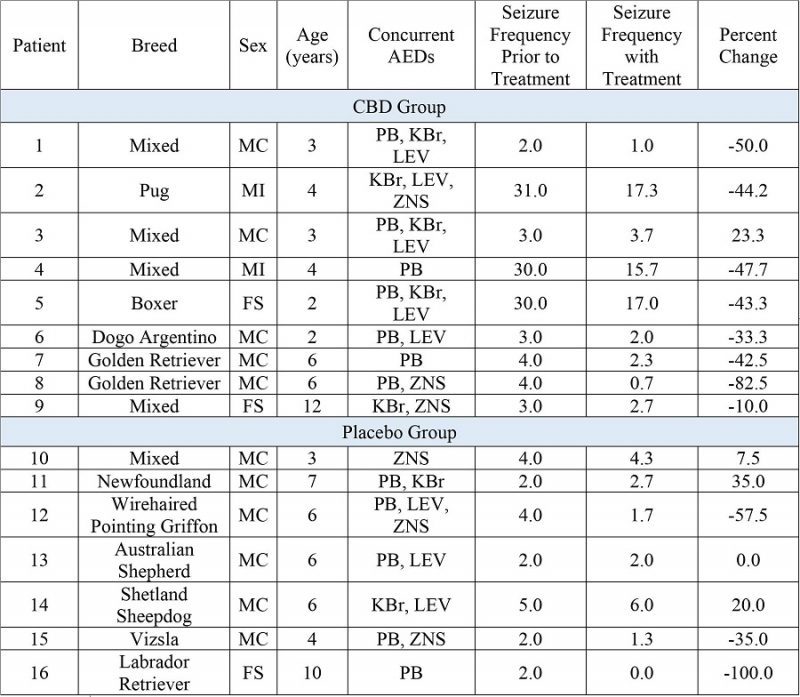Study review: Randomized blinded controlled clinical trial to assess the effect of oral cannabidiol administration in addition to conventional antiepileptic treatment on seizure frequency in dogs with intractable idiopathic epilepsy
Date: 01 June 2019
Publication: Journal of the American Veterinary Medical Association
Authors: Stephanie McGrath, Lisa R Bartner, Sangeeta Rao, Rebecca A Packer, Daniel L Gustafson
Location: Veterinary Teaching Hospital at Colorado State University
Using: two daily doses of 2.5 mg/kg of full-spectrum CBD oil for 12 weeks
Full study: https://avmajournals.avma.org/view/journals/javma/254/11/javma.254.11.1301.xml
Introduction
Idiopathic epilepsy is “the most common neurologic condition in dogs,” affecting up to 5% of the population.
Current recommended treatments for epilepsy include phenobarbital and potassium bromide. While sometimes effective, these medications fail to reduce seizures in as many as 30% of dogs, and can produce undesirable side effects.
“Anticonvulsant properties of CBD have been established in vitro.” And, a “99% pure CBD medication formulated for oral administration was approved by the US FDA for treatment-resistant epilepsy in humans.”
So researchers wanted to know if a twice-daily dose of full-spectrum CBD oil would reduce the number of seizures that dogs with epilepsy experienced.
They tested their hypothesis on 16 dogs of various ages and breeds who were already on Epilepsy treatment plans, which included prescription drugs like phenobarbital, potassium bromide, levetiracetam, and zonisamide.

(image source: https://avmajournals.avma.org/view/journals/javma/254/11/javma.254.11.1301.xml)
Table 1. Characteristics of dogs with intractable idiopathic epilepsy table following CBD treatment study
Method
All the dogs in the study were submitted by their owners and met the “tier II confidence level for diagnosis of idiopathic epilepsy.” That means they all experienced at least two seizures per month. Some of the dogs had generalized seizures and others suffered from focal seizures.
Dogs were between 2 and 12 years-old and included mixed-breeds, Golden Retriever, plus a Pug, Newfoundland, Griffon, Vizsla, and Sheepdogs.
During the study, dogs had their blood analyzed every 4 weeks, while owners kept a daily log that included observations about the “number of seizures, seizure type, and seizure duration.”
Researchers set the definition of “responding to treatment” as a “50% [or greater] reduction in mean monthly seizure frequency.”
There was also a 100+ question owner survey about changes to their dog’s behavior before and after the study, including any effects of CBD on dogs’ anxiety.
CBD used
The CBD for canine seizures used in the study was a full-spectrum extract infused in hemp seed oil. The placebo contained only hemp seed oil.
The study doesn’t mention the CBD extraction method.
CBD was administered to dogs orally. We’ll assume that means that CBD oil was administered directly into the dogs’ mouths.
Results
Two dogs in the study developed ataxia, presumably as a side effect to their CBD treatment. As found in other studies, Dog’s taking CBD also showed increased ALP live enzyme activity.
After analyzing owner surveys, researchers didn’t find any differences in behavior – things like anxiety and energy levels – between dogs in the CBD and placebo groups.
However, researchers did observe that a “significant reduction in seizure frequency was achieved in dogs with intractable idiopathic epilepsy receiving CBD-infused oil.”
That seems like a great result, and could suggest that CBD is able to improve outcomes when added to dogs’ epilepsy treatment plants.
However, the researchers also pointed out that the study only included a very small number of dogs.
Moreover, when the results from the CBD and placebo groups were compared in terms of the study’s definition of “responding to treatment,” researchers were not able to find a statistically significant difference in seizure reductions.
“No significant difference was identified between treatment groups when the proportion of “responders” was compared between groups.”
Based on the results, the researchers thought that the CBD dosage used in the study may have been too low, based on “the intractable nature of [the dogs’] epilepsy.”
They recommend a future study where dosing is increased in proportion to CBD’s effects.
